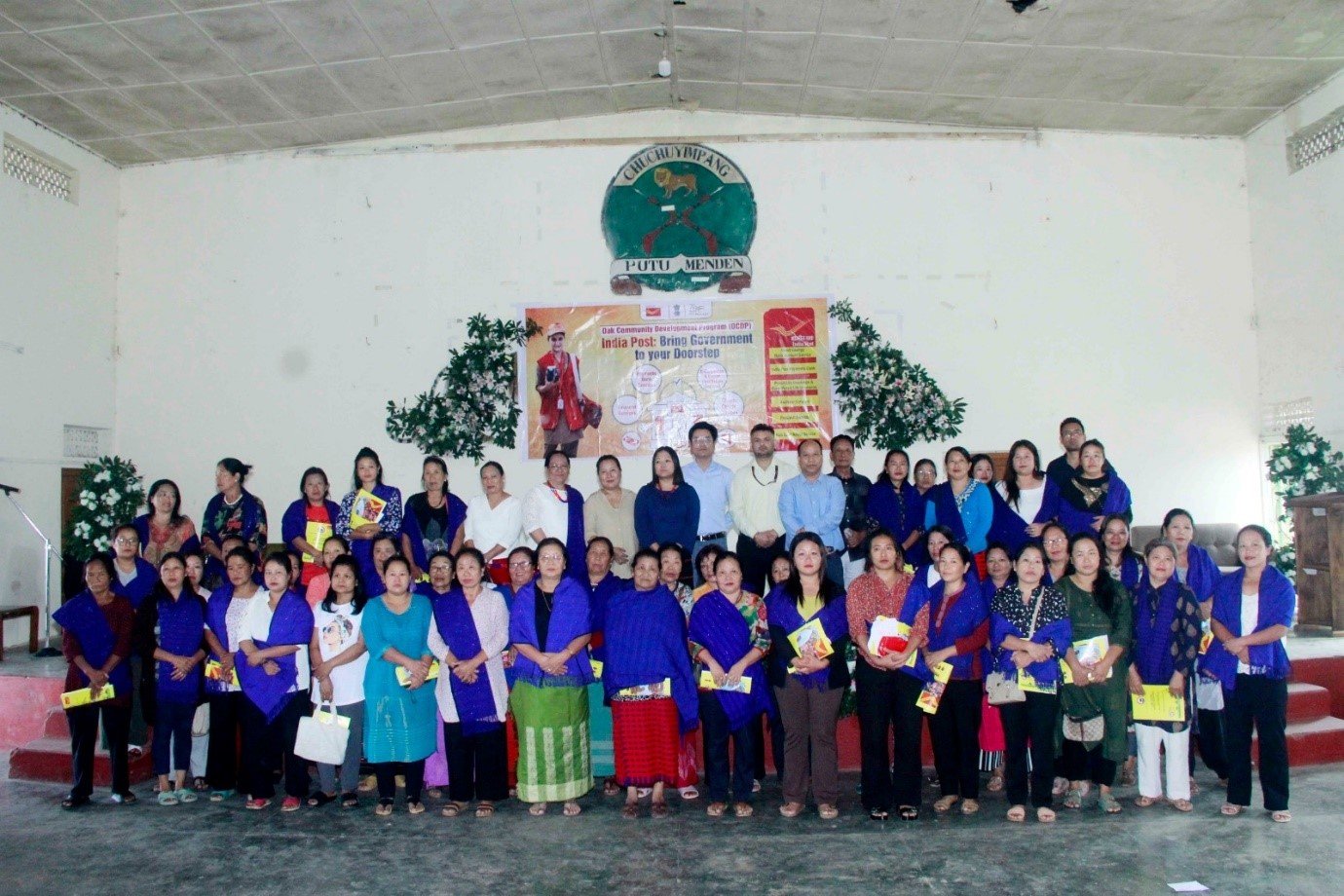The Dak Community Development Programme (DCDP) held today at Chuchuyimpang Village Community Hall in Mokokchung, Nagaland, brought together government officials and community members to discuss and promote various government schemes and services. The event aimed to empower rural communities with essential information and services.
Temsumoa Imsong, Chairman Village Council, Chuchuyimpang Village, emphasized the value of Indian Post in the past as a crucial means of communication saying the old proverb “Old is Gold”. He appreciated the India Post Office for its commitment to “Bringing Government to your doorstep” and encouraged leaders to assist the public in reaching greater heights.
Download Nagaland Tribune app on Google Play

Tajunginla, Coordinator PMMVY (DHEW), highlighted the PMMVY scheme and its expansion. She explained that the scheme covered the family’s 1st child and the 2nd child (if a girl child) from 2021 onwards. Various documents are required for enrolment, including Aadhaar cards, Scheduled Tribe certificates, and more. She informed that the scheme is under the Social Welfare Department with more than 2000 beneficiaries in the state.

Maongsangla, Deputy District Agriculture Officer, discussed agricultural schemes, including PM-Kisan, which provides financial support to farmers. She stressed the need for accurate beneficiary registration to prevent misuse of funds. She said PM-Kisan provides a quarterly payment of ₹6,000. She mentioned that there are currently 15,283 registered beneficiaries in Mokokchung district, but new registrations have been halted due to the discovery of many ineligible recipients. She announced that new registrations will resume through Village Councils soon. Due to ineligible beneficiaries, the state must return ₹4,34,000 to the central government, with 22 beneficiaries identified as ineligible. She cautioned the audience that only individuals eligible according to government directives will be listed. Additionally, there are 1,66,000 income tax-ineligible beneficiaries, and they will also need to be returned.
She highlighted the “Ghar Ghar KCC Abhiyaan” (KCC loan) that commenced in October 2023, allowing PM-Kisan beneficiaries to obtain loans based on their crop project reports.
She also mentioned Chief Minister Miro Finance Initiative, where the Agriculture Department offers two types of loans: Cold storage loan and Tata Mobile Pickup loan. For this loan, the bank will provide 60% of the loan, while the state government contributes 30%, and the beneficiaries are responsible for the remaining 10%. So far, 14 instalments of PM-Kisan payments have been disbursed to the state, she informed and asked the beneficiaries who have not received all instalment to report to the office.
Mangliyangba, District Welfare Officer, highlighted several government schemes, such as the Indira Gandhi National Old Age Pension Scheme (IGNOAPS), Indira Gandhi National Widow Pension Scheme (IGNWPS), Indira Gandhi National Disability Pension Scheme (IGNDPS) for the benefit of both urban and rural citizens. He urged attendees to become ambassadors for the Indian Postal Payments Bank (IPPB) and spread awareness.

I. Narola Jamir, Postmaster Mokokchung MDG, highlighted various postal services aimed at aiding the community. The array of services includes the National Small Savings Organisation, Small Deposits, and Postal Life Insurance, which offers savings and insurance with high bonuses and low premiums. In 2018, the Direct Benefit Transfer system was introduced, where account holders must undergo biometric verification and link their accounts with the post office.
Jamir emphasized that these initiatives target underprivileged and middle-class families who have been underserved. She pointed out that the Post Office has evolved in tandem with the changing world, offering various schemes such as Savings, Recovery, Monthly Income, National Saving School, and the Girl Child Policy with an 8% interest rate.
In 2023, the Mahila Samman Saving Scheme was introduced, offering a two-year fixed deposit with a yield between 5 to 6 years. The Senior Citizen Saving Scheme, offering an 8.2% interest rate, is available for individuals aged 60 years and above, with different categories for those aged 80 years and above.
Jamir highlighted the advantage of the Post Office, being accessible in both rural and urban centres, serving the public effectively. The Post Office has also embraced digitalization, providing online transactions, ATM facilities, and other conventional banking services. Savings accounts can be opened with a minimum deposit of 500 rupees, and various insurance policies, including Postal Life Insurance and Rural Postal Life Insurance, are available.
Jamir stressed the importance of opening insurance policies, not as a reminder of mortality but as a responsible step to secure one’s loved ones’ future.
Additionally, she introduced Dak Ghar Niryat Kendra (DNK), an initiative by the Department of Posts and CBIC. DNK allows small exporters to electronically file a Portal Bill of Export and submit parcels for export at designated centres, facilitating self-help groups engaged in the export of goods. Furthermore, Jamir discussed “Book Now Pay Later” (BNPL) and DCDP.
She informed Kohima serves as the head office, overseeing 42 sub-offices within the state and 288 branch offices. An additional 70 branch offices are slated to be implemented soon in areas lacking banking facilities.
Simranjit Gumbar, Manager, India Post Payments Bank, highlighted the benefits of IPPB, which offers paperless account opening and various financial services, including loans. He cautioned against falling victim to frauds and sharing sensitive information.
L. Tiken Singh, Superintendent of Post Nagaland Division, emphasized the role of the Indian Postal services in promoting financial literacy and socio-economic development. He noted that the DCDP aimed to reach remote areas in collaboration with the state government.
Kevikhrielie Kirha, Sub Divisional Inspector of Post Offices, delivered the Vote of Thanks, expressing gratitude to all participants and supporters of the DCDP event.
The event at Chuchuyimpang saw the participation of 24 Self-Help Groups (SHGs), local officials, and villagers.

